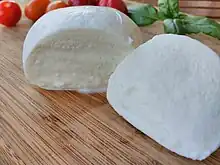This is a list of notable water buffalo cheeses. Water buffalo cheese is produced using the milk from the water buffalo. Some buffalo milk cheeses are produced using the milk from other animals as well, such as cow's milk.
Water buffalo cheeses

Kesong puti with bread
- Bagot ni horbo, dali ni horbo, or simply dali is a cheese-like traditional Batak dish from Tapanuli, North Sumatra, Indonesia, with a yellowish white appearance with tofu-like texture and milky flavor. Dali is made by boiling buffalo milk coagulated with papaya leaf or unripe pineapple juice.[1]
- Bocconcini – a small mozzarella cheese the size of an egg, like other mozzarellas, it is semi-soft, white and rindless unripened mild cheese which originated in Naples, Italy and was once made only from milk of water buffalo. Nowadays they are usually made from a combination of water buffalo and cow's milk.[2]
- Buffalo mozzarella – a mozzarella made from the milk of Mediterranea Italiana buffalo. It is a dairy product traditionally manufactured in Campania, Italy, especially in the provinces of Caserta and Salerno.[3]
- Burrata – a fresh Italian buffalo milk cheese prepared using the pasta filata method.[4]
- Caciotta – a range of types of cheese produced especially in the central regions of Italy from the milk of cows, sheep, goats or water buffalo
- Casatica – a sweet rinded log shaped cheese produced in Northern Italy.[5]
- Dangke – a type of cheese produced in South Sulawesi, Indonesia, especially in Enrekang, Baraka, Anggeraja, and Alla districts. Dangke is processed by boiling fresh buffalo milk with sliced papaya leaves, stems, or unripe papaya fruits. Dangke is typically soaked in a brine solution overnight before being wrapped with banana leaves for masking the bitter taste caused by the addition of papaya leaves.[6]
- Domiati – a soft white salty cheese made primarily in Egypt,[7] but also in Sudan and other Middle Eastern countries. Typically made from buffalo milk, cow milk, or a mixture, it can also be made from other milks, such as sheep, goat or camel milk.
- Kesong puti – a Filipino soft, unaged, white cheese made from unskimmed carabao's milk, salt, and rennet.[8]
- Khoa – a dairy product widely used in the cuisine of the Indian Subcontinent, it is made using both cow's and water buffalo milk.[9]
- Litsusu and cologanti – a type of cheese produced in East and West Nusa Tenggara, Indonesia, with enzymes from litsusu tree as coagulant.[10]
- Mozzarella – a traditionally southern Italian dairy product made from Italian buffalo's milk by the pasta filata method.[11] Mozzarella received a Traditional Specialities Guaranteed certification from the European Union in 1998. This protection scheme requires that mozzarella sold in the European Union is produced according to a traditional recipe.
- Nguri – a buffalo's milk cheese of the Fujian province in China, it is prepared in a ball-shape approximately the size of a table tennis ball, and has a soft, leathery texture.
- Provatura – a traditionally lazian dairy product made from Italian buffalo's milk by the pasta filata method.[12]
- Rumi cheese - made from cow milk or buffalo milk.[13]
- Stracciatella di bufala – produced from Italian buffalo milk in the province of Province of Foggia, located in the southern Italian region of Apulia. It is prepared using a stretching (pasta filata) and a shredding technique.[14][15]
- Surti paneer – a soft cheese associated with Surat in India, it is a type of paneer prepared from buffalo milk which is coagulated using rennet.[16]
See also
References
- ↑ Surono, Ingrid S. (2015). Traditional Indonesian dairy foods (PDF). Asia Pacific Journal of Clinical Nutrition. p. 26. Archived from the original (PDF) on December 30, 2016. Retrieved April 25, 2018.
- ↑ Elliot, E.; Lee, V. (2007). Tomatoes: Recipes from Canada's Best Chefs. Flavours Cookbook. Formac Publishing Company Limited. p. 30. ISBN 978-0-88780-728-2. Retrieved December 11, 2017.
- ↑ Hui, Y.H. (2006). Handbook of Food Science, Technology, and Engineering. CRCNET books. Taylor & Francis. p. 34. ISBN 978-0-8493-9849-0. Retrieved December 11, 2017.
- ↑ Contini, M.; Contini, P. (2012). Valvona & Crolla: A Year at an Italian Table. Ebury Publishing. p. 195. ISBN 978-1-4481-4783-0. Retrieved December 11, 2017.
- ↑ Fletcher, Janet (May 9, 2010). "Casatica is a rich water-buffalo cheese". San Francisco Chronicle. Retrieved December 12, 2017.
- ↑ Surono, Ingrid S. (2015). Traditional Indonesian dairy foods (PDF). Asia Pacific Journal of Clinical Nutrition. p. 26. Archived from the original (PDF) on December 30, 2016. Retrieved April 25, 2018.
- ↑ El-Baradei, G; Delacroix-Buchet, A; Ogier, JC (2007). "Biodiversity of bacterial ecosystems in traditional Egyptian Domiati cheese". Appl Environ Microbiol. 73 (4): 1248–55. Bibcode:2007ApEnM..73.1248E. doi:10.1128/AEM.01667-06. PMC 1828670. PMID 17189434.
- ↑ "How to Make Pastillas de Leche from Carabao's Milk". www.mixph.com. Archived from the original on 2011-07-14. Retrieved 2017-12-11.
- ↑ Fuquay, J.W.; Fox, P.F.; McSweeney, P.L.H. (2011). Encyclopedia of Dairy Sciences. Elsevier Science. p. pt1744. ISBN 978-0-12-374407-4. Retrieved December 11, 2017.
- ↑ Surono, Ingrid S. (2015). Traditional Indonesian dairy foods (PDF). Asia Pacific Journal of Clinical Nutrition. p. 26. Archived from the original (PDF) on December 30, 2016. Retrieved April 25, 2018.
- ↑ Donnelly, C.W.; Kehler, M. (2016). The Oxford Companion to Cheese. Oxford Companions. Oxford University Press. p. 499. ISBN 978-0-19-933088-1. Retrieved December 11, 2017.
- ↑ "Provatura romana". Taccuini Gastrosofici (in Italian). Retrieved 21 July 2023.
- ↑ "الجبن الرومي.. ما سر الاسم في مصر؟". سكاي نيوز عربية (in Arabic). Retrieved 2023-07-06.
- ↑ Ottogalli, Giorgio (2001). Atlante dei formaggi: guida a oltre 600 formaggi e latticini provenienti da tutto il mondo (in Italian). Milan: Hoepli Editore. p. 211. ISBN 978-88-203-2822-1.
- ↑ "Stracciatella di bufala". prodottitipici.com (in Italian). Retrieved 4 October 2013.
- ↑ The technology of traditional milk products in developing countries. Food and Agriculture Organization. ISBN 9251028990.
This article is issued from Wikipedia. The text is licensed under Creative Commons - Attribution - Sharealike. Additional terms may apply for the media files.
